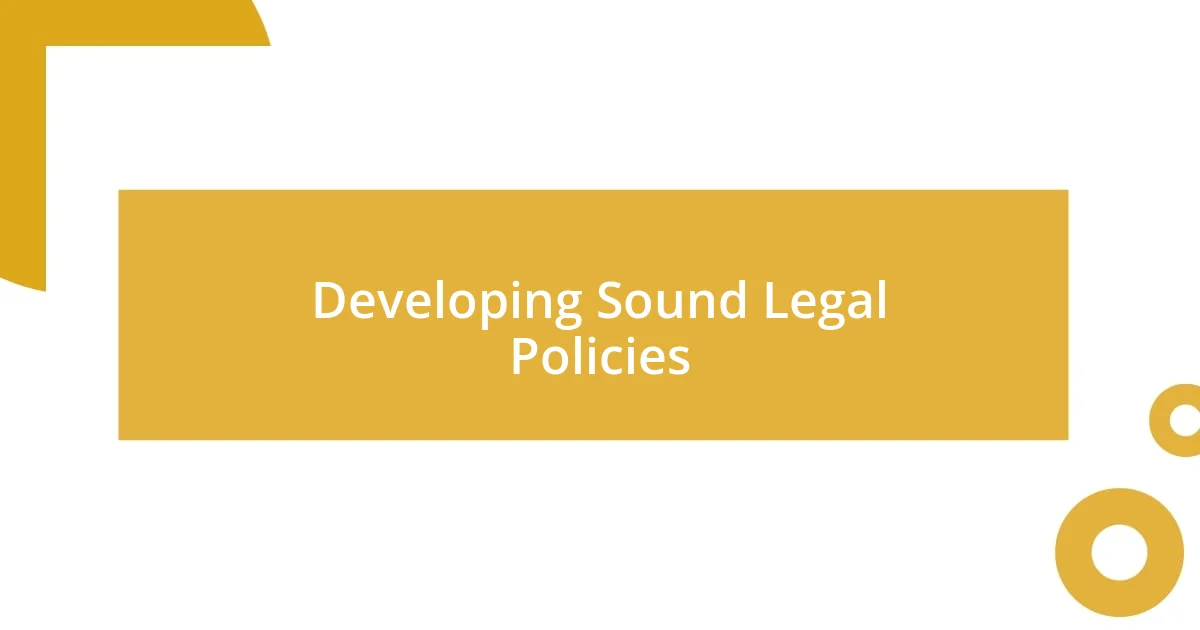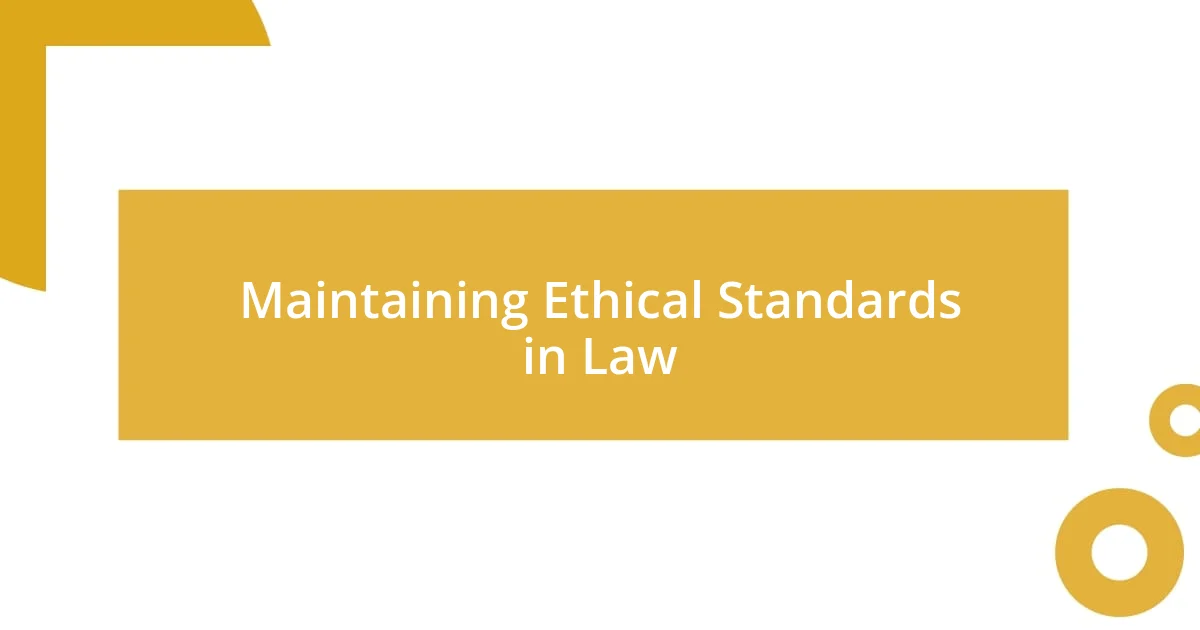Key takeaways:
- Understanding legal best practices enhances transparency and communication, leading to improved trust and outcomes in legal matters.
- Compliance fosters a culture of accountability and is crucial for decision-making and financial health, ultimately impacting client relationships and firm reputation.
- Continuous improvement and ethical standards in legal practices promote more effective strategies, cultivate team collaboration, and reinforce integrity in client interactions.

Understanding Legal Best Practices
Understanding legal best practices is essential for navigating the complexities of any legal environment. I remember a time early in my career when I encountered a situation where failing to follow a simple protocol almost led to disastrous consequences. It made me realize how vital it is to have a thorough understanding of these practices, as they serve as the roadmap for managing legal risks effectively.
One key aspect of legal best practices is maintaining transparency with clients. Have you ever wished for clearer communication during a legal process? I know how frustrating it can be when expectations aren’t met due to a lack of clarity. Establishing open channels of communication not only enhances trust but also ensures that all parties are aligned, which can significantly impact the outcome of any legal matter.
Another important consideration is the continuous education of all team members regarding legal changes. I often reflect on the times when a small update in legislation changed our approach dramatically. Staying informed not only improves compliance but also empowers everyone involved to make smarter, more informed decisions. It fascinates me how a proactive approach can prevent legal pitfalls that may arise from simple oversights.

Importance of Compliance in Law
Maintaining compliance in law goes beyond simply following rules; it’s about fostering a culture of accountability and ethics. I recall a particular instance in my career when a minor oversight in compliance led to a significant penalty for a client. The stress it caused not only affected my professional reputation but also the client’s trust. This experience taught me that compliance is the backbone of any relationship in the legal field; without it, both parties can suffer greatly.
Consider how compliance impacts decision-making processes within legal teams. In one project, I noticed how closely adhering to compliance protocols allowed us to focus on strategic solutions rather than remedial actions. This shift in focus not only increased our efficiency but also built our credibility. The more we prioritize compliance, the more confidence we instill in our clients, making it a crucial element of our professional identity.
Moreover, compliance can significantly affect a firm’s financial health. I have witnessed firsthand how firms that neglect compliance often face unexpected costs, whether in fines or lost business opportunities. When we treat compliance as an investment rather than a burden, it genuinely pays off in the long run. Ultimately, understanding the importance of compliance allows us to navigate legal landscapes with integrity and awareness.
| Aspect | Importance |
|---|---|
| Cultural Impact | Fosters accountability and trust |
| Decision-Making Efficiency | Enhances focus on strategic solutions |
| Financial Health | Prevents unexpected costs and legal issues |

Developing Sound Legal Policies
Developing sound legal policies is essential for effective risk management and operational success. I think back to my experience with a new policy implementation at my firm; the excitement was palpable, but it quickly turned into nervousness when key stakeholders weren’t on board. This taught me that clear involvement is key. When everyone understands the policy’s purpose and their role within it, it creates a sense of ownership that can significantly improve adherence and effectiveness.
Here are some critical elements to consider while developing legal policies:
- Stakeholder Engagement: Inclusivity in policy development garners commitment and reduces resistance.
- Regular Review and Updates: Policies should evolve with changing laws and organizational needs to stay relevant.
- Clear Communication: Simplifying policy language promotes understanding and compliance among all team members.
- Training Programs: Ongoing education helps ensure everyone is aware of any legal updates and their implications.
Having witnessed the transformative power of these elements, I can affirm that a meticulously developed policy doesn’t just protect an organization; it fosters a positive and proactive culture. When team members feel empowered by clear guidelines, it fosters an environment where compliance becomes second nature rather than an afterthought.

Best Practices for Document Management
Effective document management is a cornerstone of legal practice. I remember a time when my team struggled to locate critical documents for a case. The stress was palpable as deadlines loomed, reminding me just how vital it is to have an organized system. Implementing a centralized document repository not only relieved that pressure but also enhanced our efficiency in managing case files.
Having a consistent naming convention for documents is another best practice I can’t stress enough. When I first started adopting a structured naming system, I found myself saving significant time during research or retrieval. Suddenly, everything was easier to find—like having a well-labeled filing cabinet instead of a chaotic pile of paperwork. It also allows for better collaboration, as team members can easily identify the files they need without confusion.
Moreover, regularly backing up documents cannot be overlooked. I learned this lesson the hard way during a system crash that almost cost us crucial client information. Since then, I’ve made it a point to have both local and cloud-based backups in place. It’s these proactive steps that ensure data security and peace of mind, allowing my team and me to focus on what we do best: serving our clients.

Maintaining Ethical Standards in Law
Maintaining ethical standards in law is not just a requirement; it’s a commitment that defines our profession’s integrity. I vividly recall an instance where I had to decide whether to push for a client’s aggressive strategy that teetered on the edge of ethics. The thought of long-term repercussions if we went down that road left me unsettled. I realized that prioritizing ethical standards means having the courage to advise clients when they’re wrong, even if it means sacrificing short-term gains.
One valuable lesson I’ve learned over the years is that ethics training isn’t just a box to check off; it should be ingrained in the culture of any legal team. During a recent workshop, I witnessed my colleagues engaging earnestly in discussions about navigating complex ethical dilemmas. It was refreshing to see how this dialogue opened up a space for vulnerability and growth. This kind of engagement leads to collective accountability, ensuring that we not only follow the rules but also embody the spirit of ethical practice.
I often ask myself how we can balance client expectations with our ethical obligations. In my experience, the answer lies in transparent communication. For instance, during a challenging negotiation, I made it a point to share my concerns about potential ethical conflicts with the client from the onset. The appreciation they showed for my honesty ultimately strengthened our relationship and underscored the importance of ethical practice. When we prioritize ethics alongside our legal expertise, we build trust that benefits both clients and our profession as a whole.

Continuous Improvement in Legal Processes
Continuous improvement in legal processes is essential for adapting to the fast-paced changes in our profession. I remember a time when my firm decided to implement regular feedback sessions after each case. Initially, I was skeptical—would these discussions really make a difference? But revisiting our strategies regularly brought forth insights that led not only to efficiency but also to deeper team collaboration. It’s amazing how sometimes taking a step back can propel us forward.
Embracing technology is another facet of continuous improvement that I’ve found invaluable. When I first started incorporating legal tech tools, there was a learning curve, but the payoff was undeniable. I often share with my colleagues how much time I save now on contract reviews and research with AI-assisted tools. Could we ever go back to manual processes after experiencing such efficiency? The thought feels almost archaic, and it reminds me that, in our rapidly evolving field, stagnation is not an option.
Creating a culture of learning within the firm also factors into this improvement mindset. I’ve seen firsthand how encouraging ongoing education not only benefits individual lawyers but also strengthens our team as a whole. I once attended a seminar that changed the way I approach client communication. I took those insights back to my colleagues, and we ended up reworking our client engagement strategies entirely. Isn’t it fascinating how a single shared experience can elevate an entire practice? Moments like these reinforce my belief that continuous improvement isn’t just a process; it’s a mindset we all need to embrace.















